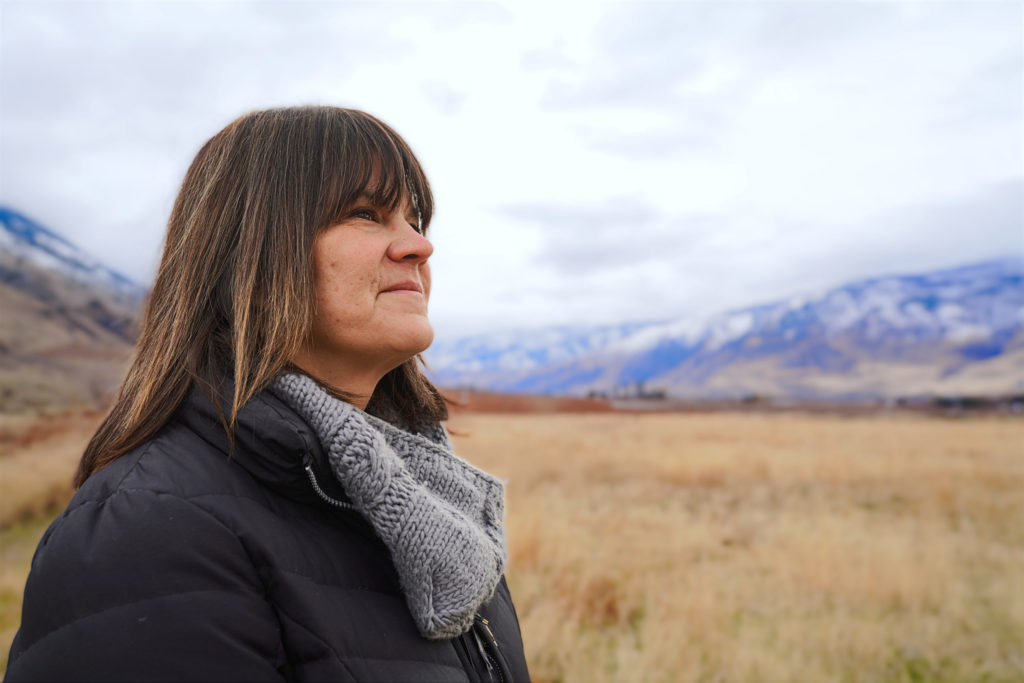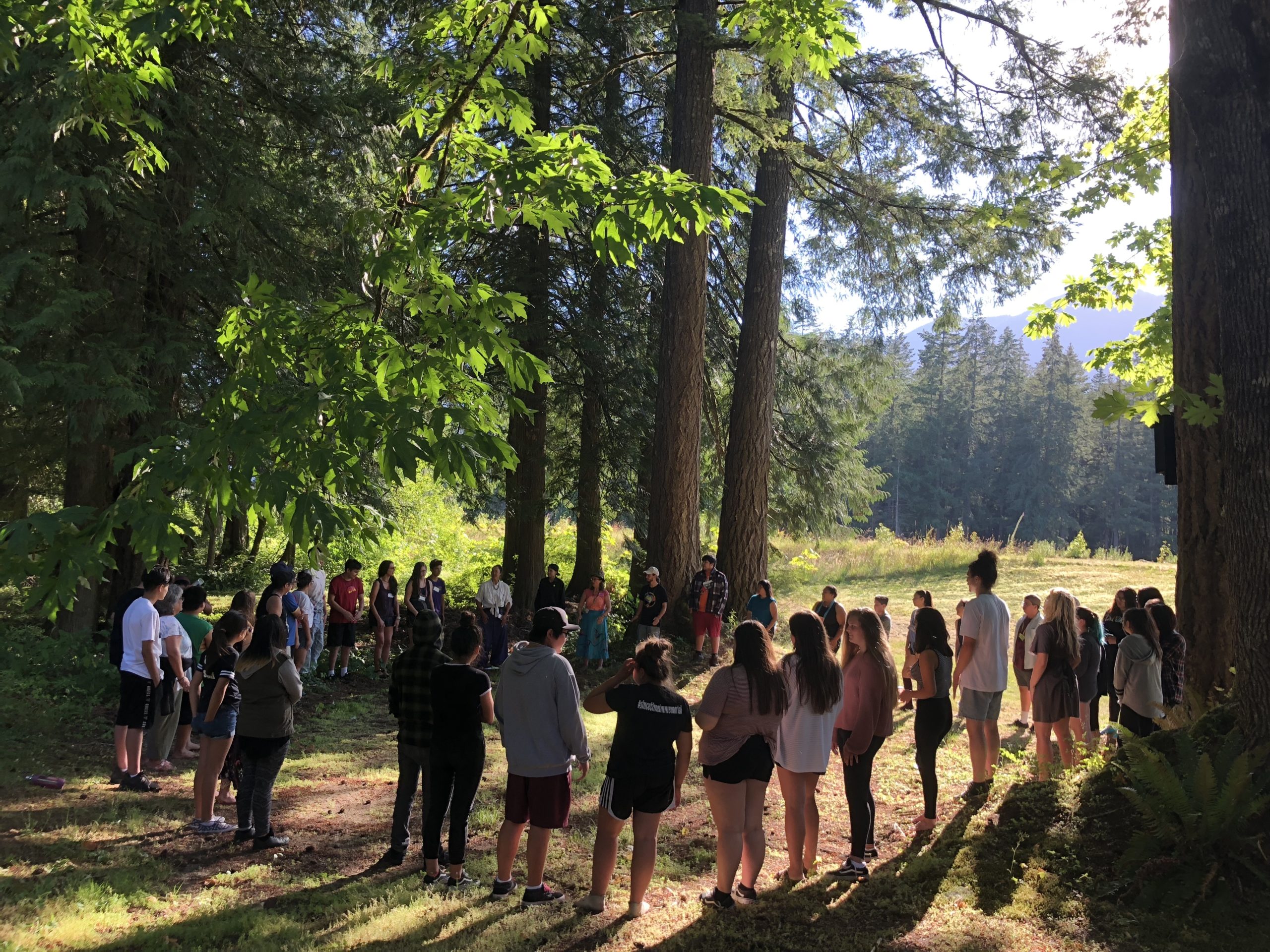
In the beautiful valleys of the Lower Similkameen, surrounded by vast mountains, orchards and cattle are the sacred traditional territories of the Smelqmix (Similkameen people).
The striking views offering a glimpse into the sacredness of tmxʷulaxʷ, the land.
It is here that Kelly Terbasket grew up on her family’s and ancestor’s territory.
“I was very privileged to grow up playing on this land, the freedom of this was our playground,” says Terbasket.
And it is here that she continues to work in service of her community.
“I’ve seen her work over the last 16 years,” says John Butcher.
“I haven’t observed anybody that works as well…working as a bridge between and she’s got a very good skill at doing that in a nice, gentle but firm way.”
Butcher put Terbasket forward as a community changemaker after IndigiNews asked for nominations of people who were making a difference in the Okanagan.
Terbasket is the program director of IndigenEYEZ, a program that she co-founded to “to better support Indigenous community members who are champions of change.” They offer land-based teachings and workshops focused on “strengthening four essential relationships: with self, with others, with nature, and with culture.”
“The thing that I think works the best is that she uses the holistic approach and it ties it all back to the land and in the development curriculum,” says Butcher.
“It’s all based on words and also arts and imagery which more effectively tells the story than just words would.”
Growing up
Terbasket’s Syilx roots can be traced back to at least 650 generations, she tells IndigiNews.
“So growing up partially here at Blind Creek, nkwrulauxw in nsyilxcən means yellow dirt and also uptown and Keremeos,” says Terbasket.
She identifies as mixed heritage with her father being Syilxw and her mother German and English.
“I grew up being kind of like navigating being part of two very distinct cultures and families of those two families,” she explains.

Her great great grandfather Paul was the first generation to take up orchard farming after the reserves were put into place, Terbasket explains.
“My great great grandfather Paul took up orcharding and [a] settler close to here taught him how to orchard,” she says.
However, after more settlers entered the area she says that her grandfather eventually lost the water rights.
“[My grandfather] said, I’m going to keep watering my orchard, cause’ I need to do that to feed my family. And they threw him in jail,” says Terbasket.
After this he took up ranching and the family has been ranching ever since.
“So my grandpa Paul was a rancher and then my dad and all my uncles were ranchers and now my cousins are ranching,” she explains.
There is still an orchard tree standing beautifully that she says is a symbol of the family.
“It’s a very beautiful landmark for us because it symbolizes that orchard and the resiliency of our family,” she says,
“And also the tenacity and the willingness to yes, say no, and to stand up for yourself.”
‘My life’s purpose’
Terbasket’s childhood out on the land continues to influence the work she does today.
“I know not everybody has had a childhood I had, and it’s partly why I feel so passionate about the work I do around connecting us to land and all our relations,” she says.
A big part of Butcher ‘s nomination points to the work that Terbasket has done with IndigenEYEZ.
“It feels good [to be nominated] because this work is,” she pauses, “you definitely don’t do this work for recognition.”
IndigenEYEZ was co-founded in 2013 by Kim Haxton and Terbasket.
“It’s really hard for me to talk about IndigenEYEZ in a succinct way, because I always say IndigenEyez isn’t a job. It is not a job for me… it’s my life’s purpose” she says.
For Terbasket part of the work she does involves de-centring herself in the work, which she explains in a telltale sign of a good facilitator.
“I really believe in empowering the voices of the participants or the youth in the workshop and empowering others,” she explains.
“I always say the sign of a good facilitator is when the people don’t leave going oh that was such a good facilitator. They leave saying that was an amazing transformative experience. And they might even forget about the facilitator. That’s a good sign.”

Part of the work that they do at IndigenEYEZ is decolonizing all of their programming.
“We have a lot to undo. So that decolonizing process is like remembering who we are and our strengths simply starts with being in silence or listening to our relatives, believing they’re our relatives authentically,” she says.
‘Connection to all living things’
Terbasket explains that she lives what she teaches and understands the fundamental importance of maintaining her Syilx teachings.
“It’s taken me a long time to stop objectifying the land and to stop centring humans,” she says.
“De-centring us as humans and remembering that snaqsilx.”
“snaqsilx refers to all syilx people and their connection to one another, to their land, and all living things,” as explained on the Okanagan Nation Alliance website.
“It’s really about an intimate connection of communication and being with each other,” she says.
“What I’ve realized through ceremony and through over different experiences I’ve had on the land is that the land and our relatives, our medicines, our food and all our relations are part of our family and that they’re there for us.
“They’re lonely for us. That we are missing out by not being in relationship with them.”

Terbasket says this past year their funding has been impacted due to COVID-19, but this has given them more time to write and develop an online curriculum.
“I resisted for months,” she says, I didn’t think you could do it online and I was wrong and COVID forced me to see that. So we started developing online workshops.”
She says they are also working on more curriculum for their signature workshops as well working with partners such as the University of British Columbia and Okanagan College.
“A lot of our key partners we’ve been finally writing curriculum and developing really great tools,” she says.
When developing the training they center it around four key questions, “what do we want people to think, feel, relate and act differently,” says Terbasket.
“In order for us to make change, it requires us to change inside. And for us to change inside, we have to step out of our comfort zone and we have to think differently,” she says,
“I think one of the biggest shifts that we can all make, whether it’s between addressing lateral violence and our relationships of Indigenous people or whether it’s settlers and the TRC journey is one of the big steps is around shifting from judgment, being judgmental.
“And so moving from judgment and hierarchy to circle and curiosity…there’s that expression, you can’t be judgmental and curious at the same time.”
Terbasket believes that strength comes from diversity and we need to create spaces to invite these differences.
“We need to become comfortable with that tension and create spaces and invite in our differences and to be able to learn from each other, versus I judge you because you’re different.
“So that’s what I dream of [that] this work that we do is fostering more inclusive, safer communities for everyone.”



